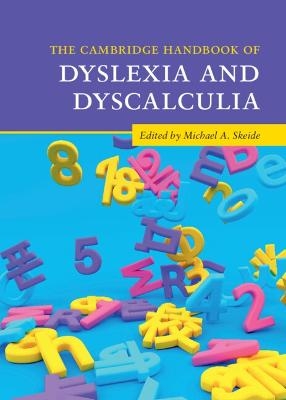
The Cambridge Handbook of Dyslexia and Dyscalculia
Cambridge University Press (Verlag)
978-1-108-83319-6 (ISBN)
In this handbook, the world's leading researchers answer fundamental questions about dyslexia and dyscalculia based on authoritative reviews of the scientific literature. It provides an overview from the basic science foundations to best practice in schooling and educational policy, covering research topics ranging from genes, environments, and cognition to prevention, intervention and educational practice. With clear explanations of scientific concepts, research methods, statistical models and technical terms within a cross-cultural perspective, this book will be a go-to reference for researchers, instructors, students, policymakers, educators, teachers, therapists, psychologists, physicians and those affected by learning difficulties.
Michael A. Skeide is leader of the Learning in Early Childhood Research Group at the Max Planck Institute for Human Cognitive and Brain Sciences, Leipzig, Germany.
List of Figures and Tables; List of Contributors; Acknowledgements; General introduction Michael A. Skeide; Part I. Theoretical frameworks and computational models: 1. Theories of dyslexia Usha Goswami; 2. Theories of dyscalculia Vinod Menon and Hyesang Chang; 3. Computational models of reading and mathematical difficulties Marco Zorzi & Alberto Testolin; Part II. Cognitive profiles and behavioral manifestations: 4. Cognitive profiles and co-occurrence of dyslexia and dyscalculia Chiara Banfi, Karin Landerl and Kristina Moll; 5. Reading and mathematics anxiety Dénes Szűcs; Part III. Genetic and environmental influences: 6. Genetic and environmental influences on dyslexia and dyscalculia Margherita Malanchini and Agnieszka Gidziela; 7. Pre- and postnatal environmental effects on learning to read and mathematical learning Florence Bouhali and Fumiko Hoeft; Part IV. Neurodevelopmental foundations: 8. Neurogenetic insights into the origins of dyslexia and dyscalculia Michael A. Skeide; 9. Longitudinal neural observation studies of dyslexia Gorka Fraga González, Katarzyna Jednoróg and Silvia Brem; 10. Longitudinal neural observation studies of dyscalculia Karin Kucian and Ursina McCaskey; 11. Neuroplasticity in response to reading intervention Jason D. Yeatman; 12. Neuroplasticity in response to mathematical intervention Teresa Iuculano; Part V. Gender, ethnicity and socioeconomic background: 13. Gender and sex differences in dyslexia and dyscalculia Jessica F. Cantlon; 14. The role of socioeconomic and ethnic disparities for dyslexia and dyscalculia Rachel Fish; Part VI. Cultural unity and diversity: 15. Cross-cultural unity and diversity of dyslexia Wai Ting Siok; 16. Cross-cultural unity and diversity of dyscalculia Baihan Lyu and Xinlin Zhou; Part VII. Early prediction: 17. Early prediction of learning outcomes in reading Arne O. Lervåg and Monica Melby-Lervåg; 18. Early prediction of learning outcomes in mathematics Elizabeth A. Gunderson; Part VIII. Intervention and compensation: 19. Randomized controlled trials in dyslexia and dyscalculia Katharina Galuschka and Gerd Schulte-Körne; 20. Cognitive enhancement and brain stimulation in dyslexia and dyscalculia Nienke E. R. van Bueren, Evelyn H. Kroesbergen and Roi Cohen Kadosh; 21. Persistence and fadeout of responses to reading and mathematical interventions H. Moriah Sokolowski and Lien Peters; Part IX. Best practice: diagnostics and prevention: 22. Diagnosis of dyslexia and dyscalculia: challenges and controversies Thomas Lachmann, Kirstin Bergström, Julia Huber and Hans-Christoph Nürk; 23. Prevention of dyslexia and dyscalculia Marcus Hasselhorn and Wolfgang Schneider; Part X. Best practice: schooling and educational policy: 24. Dyslexia and the dyslexia-like picture: Supporting all children in primary school Sonali Nag; 25. Best practice and policy in math education in school Antje Ehlert and Luisa Wagner; General summary Michael A. Skeide; References; Index.
| Erscheinungsdatum | 19.07.2022 |
|---|---|
| Reihe/Serie | Cambridge Handbooks in Psychology |
| Zusatzinfo | Worked examples or Exercises |
| Verlagsort | Cambridge |
| Sprache | englisch |
| Maße | 183 x 261 mm |
| Gewicht | 1360 g |
| Themenwelt | Geisteswissenschaften ► Psychologie ► Allgemeine Psychologie |
| Geisteswissenschaften ► Psychologie ► Pädagogische Psychologie | |
| Geisteswissenschaften ► Psychologie ► Verhaltenstherapie | |
| Geisteswissenschaften ► Sprach- / Literaturwissenschaft ► Sprachwissenschaft | |
| ISBN-10 | 1-108-83319-5 / 1108833195 |
| ISBN-13 | 978-1-108-83319-6 / 9781108833196 |
| Zustand | Neuware |
| Informationen gemäß Produktsicherheitsverordnung (GPSR) | |
| Haben Sie eine Frage zum Produkt? |
aus dem Bereich


